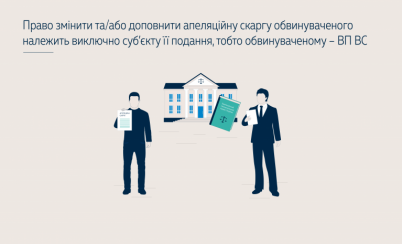Contact center of the Ukrainian Judiciary 044 207-35-46

For the purposes of Part 3 of Art. 403 of the Criminal Procedural Code of Ukraine (CPC of Ukraine), a "person who filed an appeal" is only a participant in the proceedings who has exercised the right to appeal on his own behalf. The right to amend and/or supplement the accused's appeal is vested exclusively in the subject of the appeal, i.e. the accused.
This conclusion was made by the Grand Chamber of the Supreme Court.
In the present case, the court of first instance, confirmed by the decision of the court of appeal, sentenced the complainant to 8 years' imprisonment under Part 1 of Article 115 of the Criminal Code of Ukraine.
In his cassation appeal, the convicted person pointed to the incorrect application of the Ukrainian law on criminal liability by the courts of the first instance and to a significant violation of the requirements of the criminal procedure law. In particular, he considered the failure of the appellate court to verify the arguments presented by his defence counsel in the amendments to the appeal to be a significant violation of the criminal procedure law and disagreed with the panel's conclusion that the defence counsel had no procedural right to make the relevant amendments to the accused's appeal.
The Grand Chamber of the Supreme Court noted that in accordance with Part 4 of Article 46 of the CPC of Ukraine, the defence counsel enjoys the procedural rights of the suspect or accused, whose defence he or she provides, except for procedural rights, the exercise of which is carried out directly by the suspect or accused and cannot be entrusted to the defence counsel. The vast majority of procedural rights of a suspect, accused, convicted, acquitted person and defence counsel are similar (except for those that cannot be exercised by the defence counsel independently), and their content is duplicated by the legislator in the relevant provisions of the CPC of Ukraine.
At the same time, certain procedural rights are inextricably linked to the identity of the indispensable participants in the proceedings, are exercised exclusively by them in person and cannot be delegated to anyone, including a defence counsel or representative.
Thus, although the defence counsel acts in the interests of the client, he or she is an independent participant in criminal proceedings with his or her own legal personality, and his or her legal position is not identical to that of the person whose defence he or she is providing.
In the opinion of the SC Grand Chamber, the interpretation of the term ‘person who filed an appeal’ as covering not only the direct initiator of the appeal proceedings, but also the person authorised by him/her and acting on his/her behalf, would mean that the defence counsel enjoys much broader powers than the client himself/herself. In other words, in this case, the defence counsel (unlike the accused, who can only amend or supplement his own appeal) would be entitled to the relevant right in respect of the appeal filed by both him and his client.
Moreover, as the Grand Chamber of the Supreme Court has held, the lack of procedural powers of the defence counsel to amend and/or supplement the appeal filed by the accused does not constitute an obstacle to the exercise of the right of defence. This is because, even if the appeal previously lodged by the accused or another defence counsel is seriously deficient, the procedural means available to the defence counsel to provide an effective defence at the relevant stage of the proceedings are not limited to the personal amendment and/or supplementation of such an appeal. For example, the defence counsel is not deprived of the possibility of providing qualified legal assistance in the preparation of amendments or additions to the client's appeal, which the latter may submit personally; of submitting his own appeal to the court of appeal; of expressing his position on the appeal previously submitted to the court; of submitting additional arguments and reasons, which the court must examine within the limits of the powers conferred on it by law.
In view of the above, the Grand Chamber of the Supreme Court concluded that a "person who filed an appeal" within the meaning of Part 3 of Article 403 of the CPC of Ukraine is only a participant in the court proceedings who has exercised the right to appeal on his or her own behalf. The right to amend and/or supplement the accused's appeal is vested exclusively in the subject of the appeal, i.e. the accused.
The Resolution of the Grand Chamber of the Supreme Court of 24 April 2024 in case No. 304/1035/20 (proceedings No. 13-58кс23) - https://reyestr.court.gov.ua/Review/119045334.
This and other legal positions of the Supreme Court can be found in the Database of Legal Positions of the Supreme Court - https://lpd.court.gov.ua.